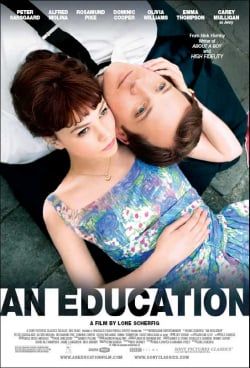Interview: An Education's Lone Scherfig And Nick Hornby

Lone Scherfig and Nick Hornby come from wildly different backgrounds-- she a Danish filmmaker with ties to Lars von Trier's strict Dogme 95 movement, he an English novelist famous for guy-centric books like High Fidelity-- but somehow the two have come together beautifully for An Education, a light drama about a young girl coming of age in 1961 England, thanks to a relationship with a much older man who introduces her to a whole new world she only dreamed of before. Hornby wrote the screenplay based on Lynn Barber's memoir, with Scherfig directing.
The film, which opened in limited release last weekend, has gotten a lot of attention for Carey Mulligan's lead performance, but as Scherfig and Hornby will be the first to tell you, there's a lot of other things to love in the film. Below read Scherfig and Hornby's thoughts on the undercurrent of anti-Semitism in the film (Peter Sarsgaard's character David, the older man, is Jewish), casting Carey Mulligan alongside the rest of the cast, and how Scherfig's background in the stark Dogme 95 movement influenced this beautiful film.
Why did David need to be Jewish?
Nick Hornby: First of all, in the memoir, he was. Why I kept him Jewish was that in my childhood, there were memories of discovering that an awful lot of my elders and betters were anti-semitic and racist in various ways. I realized that it had been part of Britiain's cultural history at that point. The other thing that interested me was the mention of the name Peter Rachman, which is touched on very very slightly in the movie but who was a kind of big Jewish landlord gangster of the late 50s and early 60s, and whose treatment of his tenants was so dispicable that it resulted in a change of the law. We still use the word Rachmannism, Rachmannism being a kind of particularly exploitative landlord. There was this sort of Jewish gangster underclass at the end of the 50s beginning of the 60s that I've never seen on film before.
How did your Dogme experience shape this film?
Lone Scherfig: I tried to influence the actors to really listen to one another, to speak with an element of unpredicability within every moment of a film. Something that I really loved about Dogme was to consider obstacles gifts. That if something doesn't go where you want it to you just have to make it work for the film. Having said all of that, this is the only film I've ever done where I've been most faithful to the script and the film looks a lot like the script. I didn't have the possibility of taking it as far in that direction as I might have wanted to. It may be a better film because I didn't. But because it was a Nick Hornby script and because I was working in England with producers who were more hands on than I've experienced, I didn't do some things that I might've liked to do.
I don't want to complain because I'm very happy with the film but Dogma is so much fun for the director, and this job wasn't about having fun, it was about that you should be entertained. I think all good art comes from taking risks and the risk here for me was trusting that the script could carry a film and that the seduction of the script was strong enough to carry a plot that's not that unfamiliar.
CINEMABLEND NEWSLETTER
Your Daily Blend of Entertainment News
How did you cast Carey Mulligan in the lead role?
Lone Scherfig: She was just the best, and even better than you could've hoped for. She's easy to direct, I think the way she says lines and the way she talks is just interesting and classy. To use a word I haven't used about her yet, I think she has good taste. That makes it easier because I like what she does and that's what makes it a good starting point for making each other better. Her making me a better director and my making her a better actress.
Nick Hornby: I joked with Amanda and Finola, the producers, before the film was made, because you can never tell what critics will say or not say, but one line you will never ever hear from critics is, "I loved this movie but that girl was terrible." That was all we had, and we absolutely relied on Carey being as good as she is.
But the whole ensemble is good as well.
Nick Hornby: They're like a band to me now. Once I've seen it a few times it really feels as though people step up and take solos and step back again. They all have an empathetic understanding of each other like a rhythm section. I think they play beautifully off each other which is such a tribute to Lone. It's not just Carey's film in an interesting way. She's in every single scene but she doesn't just flatten out other people, so incandescent that you just don't notice everyone else. She's a generous actor.
Lone Scherfig: They all get their moment. And they're all just brilliant actors. They are so well prepared and they have such strong discipline when it comes to scripts, that's the tradition they come from, and they're super professional. The access to their work comes from the script and research rather than emotions, which is more the American approach and what I'm used to working with. I don't think things get less touching and emotional just because they're professional. They do a proper job and I love that.
Staff Writer at CinemaBlend
Most Popular








